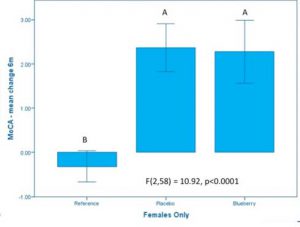This article originally appeared on the Cheatham Chat.
As we age, we experience gradual cognitive decline as our brains process things slower and our ability to remember things decreases. Blueberries contain anthocyanins, which have been shown to effect the areas of the brain that are related to memory and processing in animal studies. The effect of blueberries on brain function in humans is only now beginning to be tested. Thus, we received funding to conduct the B.E.R.R.Y (Blueberries: Exciting Research Relevant to You) study, and set out to determine if consuming blueberries would have an effect on mild cognitive decline in humans.
In order to answer this question, we conducted a 6-month double-blind (neither the researchers nor the participants knew to which powder group they belonged) clinical trial with 65- to 79-year-olds. We used freeze-dried blueberry powder supplied by the Wild Blueberry Association of North America and purchased a placebo developed by the Highbush Blueberry Council. Study groups included a reference group of with no cognitive decline, a group with mild cognitive decline who consumed 35 grams of blueberry powder a day (equivalent to two cups of blueberries) for 6 months, and a group with mild cognitive decline who consumed 35 grams of placebo powder a day for 6 months. In total, we screened 296 participants to arrive at the final sample of 71 in the intervention group and 45 in the reference group: a total of 113 participants in the BERRY Study. The last session was completed in May 2015.
Preliminary Reports:
The preliminary reports suggest that the blueberry intervention was effective in improving cognitive scores on the Montreal Cognitive Assessment (MoCA), a paper-based test used to diagnose mild cognitive decline. Interestingly, we saw no difference from MoCA scores between the blueberry and placebo group, until we separated the men’s scores from women’s scores (see Figures 1 & 2). The blueberry intervention had a significant effect on the men in the study. We have discussed that this result may be due to the women in our study benefitting from the social interaction and support from attending the sessions more than the men did.
In addition, we found that the blueberry intervention had an effect on processing speed in our most difficult test in a computerized test battery. One of the tasks required the participant to push a button when a certain pattern of numbers was seen. The blueberry group improved on this specific task across the 6-month period compared to those who were on the placebo.

Figure 1

Figure 2

